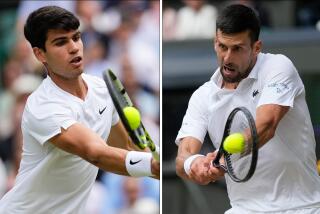Williams Will Defend Her Crown
- Share via
WIMBLEDON, England — The emotions shifted so abruptly, so suddenly.
“Allez,” Amelie Mauresmo would shout. After a crafty forehand volley or a whip-like one-handed backhand cut through the swirling wind and wrong-footed Serena Williams, Mauresmo, her ponytail waving, would bellow out her rallying cry in French and pump her fists.
“Ahhh, yes.” That was the primal cry from Williams. It would come after a particularly ferocious forehand had brought chalk off the line or when a serve would leave Mauresmo fastened helplessly to the ground.
Or there were howls, from both women, who so often followed brilliant shot-making with thoughtless mistakes or ill-timed mis-hits. Or when they tried too much. Or too little. But then Mauresmo, after she had whimpered from the pain of a sore back, would let loose with a running forehand. And Williams, after misplacing the range of her forehand two, three, four times in a row, would race to the net and drop a soft volley to the grass.
It was the most confounding, exhilarating, clever, heartbreaking, heart-stopping tennis played by two women this year.
Down a set and a break and seemingly baffled by her own mistakes and Mauresmo’s gritty fortitude, two-time Wimbledon defending champion Williams gutted out a 6-7 (4), 7-5, 6-4 semifinal victory over the fourth-seeded Mauresmo on Thursday on Centre Court.
In Saturday’s final Williams will face teenager Maria Sharapova, who handed 1999 champion Lindsay Davenport what was probably her final singles loss here. After serving flawlessly for a set and a half, Davenport lost her rhythm after a rain delay and was gradually knocked off the court by the relentless power of the 17-year-old.
After her 2-6, 7-6 (5), 6-1 win, Sharapova brushed tears from her eyes and exclaimed, “It’s a shock,” about making it to her first Grand Slam final and becoming the first Russian woman to reach a Wimbledon singles final since Olga Morozova lost to Chris Evert in 1974.
“I’d be surprised if I was back,” said Davenport, who would prefer there not be a gaudy farewell tour filled with emotional goodbyes and pretty gifts. Davenport, 28, had hoped for a fourth major title as her parting gift and seemed on the way to the finals when a 52-minute second-set rain delay helped turn the match.
Before the rain, Davenport was making nearly 80% of her first serves and putting them in corners and on lines. She was leading 6-2, 2-1, with a service break in hand. After the break, the second of the match, Sharapova won 12 of 16 points and gained confidence with each wallop. Her laser ground strokes kept Davenport pinned deep in the backcourt and exposed Davenport’s biggest weakness, her movement.
Still, Davenport had break points in the ninth and 11th games of the second set. Sharapova came up with an ace on the first and a service winner on the second.
“With that big serve of hers,” Sharapova said, “if she gets that break she’s serving for the match. It’s basically over.”
Said Davenport: “I would have liked my chances.”
Sharapova, Russian-born and California-trained under Robert Lansdorp, leaped when Davenport’s final forehand went long. She covered her eyes, then blew kisses to the crowd, which had fervently supported her.
After match point Sharapova said, “I didn’t know how to react. I look at my dad and I look at my coach and I tell them, ‘Am I in the final?’ I mean, I’m playing the finals on Saturday!”
Williams was equally emotional about moving to the final. Though this will be her eighth Grand Slam final -- she has won seven -- Williams, 22, has been through a physically and mentally difficult year since she won her second consecutive Wimbledon title in 2003. In August, Williams had knee surgery, and in September her half sister, Yetunde Price, was killed in a Los Angeles drive-by shooting.
“This has been a very, very difficult year for Serena,” her father, Richard Williams, said. “She won’t talk about it, but she has gone through very tough times.”
Although the supremely talented Mauresmo has tended to crack under pressure, it seemed Williams would be first to succumb Thursday.
Behind 3-1 in the second set, Williams was down 0-30 on her own serve after two badly hit backhands. After the second mistake, Williams slammed her racket to the ground. The crunch was heard around the court, but Williams won three consecutive points before the frame buckled.
Williams seemed to channel her anger into aggressive tennis. She began approaching the net more and controlling points with her volleys as well as her power.
As proof of the all-out effort, Williams hit 44 winners and 42 unforced errors in the 2-hour 27-minute match. Mauresmo had 27 winners and 36 unforced errors. It was either big gains or big mistakes by both.
Mauresmo left the court once and needed on-court treatment during several changeovers because of her sore lower back.
“Maybe it would have been the same result if the back was good. You never know,” she said. “But maybe it made it a little easier for her sometimes to be able to return and break me.”
To win a third consecutive Wimbledon might be Williams’ best tennis moment yet.
“It hasn’t been an easy road back,” Williams told reporters. “To be in the finals, you guys always expect me to win, expect me to be in the final. But it’s not so easy all the time.”
More to Read
Go beyond the scoreboard
Get the latest on L.A.'s teams in the daily Sports Report newsletter.
You may occasionally receive promotional content from the Los Angeles Times.










